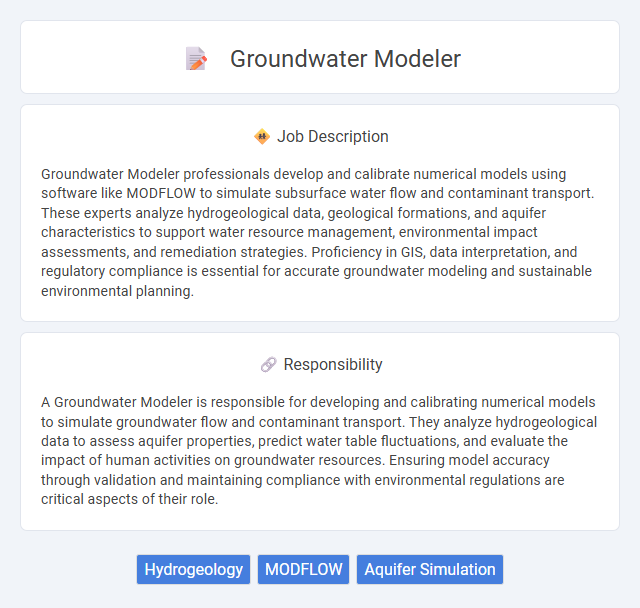
Groundwater Modeler professionals develop and calibrate numerical models using software like MODFLOW to simulate subsurface water flow and contaminant transport. These experts analyze hydrogeological data, geological formations, and aquifer characteristics to support water resource management, environmental impact assessments, and remediation strategies. Proficiency in GIS, data interpretation, and regulatory compliance is essential for accurate groundwater modeling and sustainable environmental planning.
Individuals with strong analytical skills and a background in hydrogeology or environmental science are likely suitable for a Groundwater Modeler role. Those who enjoy working with complex data sets and simulating groundwater flow patterns may find the job fulfilling and aligned with their interests. Candidates lacking attention to detail or an interest in environmental systems might find the position challenging and less compatible with their strengths.
Qualification
A Groundwater Modeler requires a strong foundation in hydrogeology, environmental engineering, or geoscience, often supported by a bachelor's or master's degree in these fields. Proficiency in groundwater modeling software such as MODFLOW, Visual MODFLOW, or FEFLOW is essential for simulating subsurface water flow and contaminant transport accurately. Experience with GIS tools, data analysis, and a solid understanding of aquifer properties, hydrologic cycle processes, and regulatory frameworks are critical qualifications for success in this role.
Responsibility
A Groundwater Modeler is responsible for developing and calibrating numerical models to simulate groundwater flow and contaminant transport. They analyze hydrogeological data to assess aquifer properties, predict water table fluctuations, and evaluate the impact of human activities on groundwater resources. Ensuring model accuracy through validation and maintaining compliance with environmental regulations are critical aspects of their role.
Benefit
Working as a Groundwater Modeler likely offers the benefit of applying advanced simulation techniques to predict water flow and contamination, which can enhance environmental protection efforts. There is probably a strong potential for contributing to sustainable resource management and influencing policy decisions. Job prospects may also include collaboration with multidisciplinary teams, offering opportunities for professional growth and skill development in geosciences and modeling software.
Challenge
Groundwater Modeler roles likely present challenges in accurately simulating complex subsurface water flow and contamination transport due to variable geological conditions. Managing large datasets and integrating multiple data sources may increase the difficulty of creating reliable predictive models. The need for continuous updates and calibration to reflect environmental changes probably demands strong analytical skills and adaptability.
Career Advancement
Groundwater Modelers leverage advanced hydrological software and data analysis to simulate subsurface water flow, critical for environmental assessment and resource management. Expertise in numerical modeling and GIS tools opens pathways to senior hydrogeologist roles, project management, and consultancy positions within environmental firms or government agencies. Continuous skill development in emerging technologies, regulatory frameworks, and interdisciplinary collaboration is essential for career progression in this specialized field.
Key Terms
Hydrogeology
A Groundwater Modeler specializing in hydrogeology develops and calibrates numerical models to simulate groundwater flow, recharge, and contaminant transport in aquifers. Expertise in hydrogeological data analysis, hydraulic conductivity, porosity, and aquifer properties is critical for predicting groundwater behavior and supporting water resource management. Proficiency with software such as MODFLOW, FEFLOW, or GMS enhances the accuracy of groundwater models essential for environmental impact assessments and remediation projects.
MODFLOW
A Groundwater Modeler specializing in MODFLOW develops and calibrates groundwater flow models to simulate aquifer behavior, predict water table changes, and assess contaminant transport. Expertise in MODFLOW includes constructing three-dimensional finite-difference grids, setting boundary conditions, and integrating hydrogeologic data to evaluate groundwater availability and sustainability. Proficiency in MODFLOW packages such as MODPATH and MT3DMS enhances model accuracy for groundwater flow and solute transport analysis.
Aquifer Simulation
Groundwater modelers specializing in aquifer simulation develop and calibrate numerical models to predict groundwater flow and contaminant transport within various aquifer systems. They utilize software platforms like MODFLOW and FEFLOW to analyze hydrogeological data, assess aquifer recharge rates, and optimize groundwater resource management. Expertise in geospatial analysis, hydrostratigraphy, and parameter estimation enhances the accuracy and reliability of aquifer behavior forecasts essential for environmental planning and sustainable water supply management.
 kuljobs.com
kuljobs.com